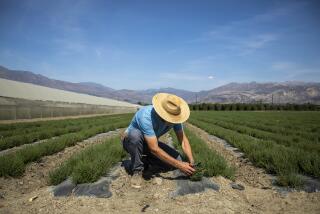Organic farming, carefully done, can be efficient
- Share via
Organic agriculture generally comes at a cost of smaller harvests compared with conventional agriculture, but that gap can be narrowed with careful selection of crop type, growing conditions and management techniques, according a new study.
Organic farming has been touted by supporters as a more environmentally sustainable method of farming that’s better for consumers because crops contain fewer man-made chemicals. But without the high-nitrogen fertilizers and pesticides often employed in conventional agriculture, it’s also less efficient.
“The organic-versus-conventional debate is very emotional, very heated, and it’s not really informed sufficiently by scientific evidence,” said Verena Seufert, a geographer at McGill University in Montreal and lead author of the study published online Wednesday by the journal Nature.
To take a hard look at the data, Seufert and her colleagues collected 66 published papers comparing organic and conventional yields for 34 crop species, including wheat, tomatoes and soybeans. They focused on studies that tested growing systems that were truly organic — meaning they rotated crops to allow the soil’s nutrients to be replenished, used organic fertilizers and employed insects instead of chemicals to keep pests in check. Altogether, the analysis included 316 head-to-head comparisons.
Overall, the team found that yields from organic farming in developed countries were 20% lower than when farmers used conventional methods. When the researchers expanded the analysis to include developing countries, the gap widened to 25%.
At first blush, most farmers would consider that unacceptable, said Michel Cavigelli, a soil scientist with the U.S. Department of Agriculture in Beltsville, Md., who was not involved in the study. But after considering how much more research has gone into conventional agriculture compared with organic, he added, the results are more impressive.
“There’s a lot of potential here with organic agriculture,” Cavigelli said. “We need to improve the systems.”
In fact, in cases in which growers used techniques that are considered to be the best practices for organic farming, the gap between organic and conventional yields narrowed to 13%.
“If you do things as well as you can, then the yield difference is very small,” Cavigelli said.
Some crop yields didn’t suffer much by following organic practices, the study found. Organic fruits such as strawberries and apples saw just a 3% difference, and oilseed crops followed just 11% behind their conventionally grown counterparts. Yields for organic cereals, however, were 26% lower, and organic vegetables lagged behind by 33%.
Nitrogen typically can’t be taken up by plants until it’s processed by soil microbes. For fast-growing annuals and other crops, this can be a problem — one often fixed by augmenting the soil with chemical fertilizers.
Legumes, however, can pull much of their nitrogen from the air, and perennials grow slower and can stay in step with nitrogen’s gradual release. So yields for these types of crops — including soybeans and tree fruits — were only 5% lower when grown organically instead of conventionally, the researchers reported.
As for settling the question of which system is better, the findings don’t provide a black-and-white answer, Cavigelli said. Organic proponents are sure to be disappointed with the size of the overall gap, and many conventional farmers still won’t see the practicality of foregoing chemical fertilizers and pesticides.
John Reganold, a Washington State University agroecologist who was not involved in the study, agreed.
“People think organic is not going to feed the world,” Reganold said, whose own research has found that organically grown strawberries contain more nutrients than their conventionally grown counterparts. “Well guess what? No one farming system’s going to feed the planet. It’s going to take a blend to guarantee us global food security.”





